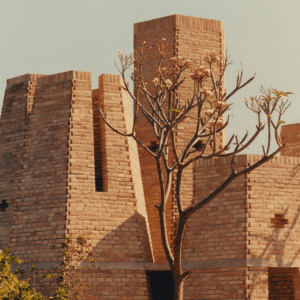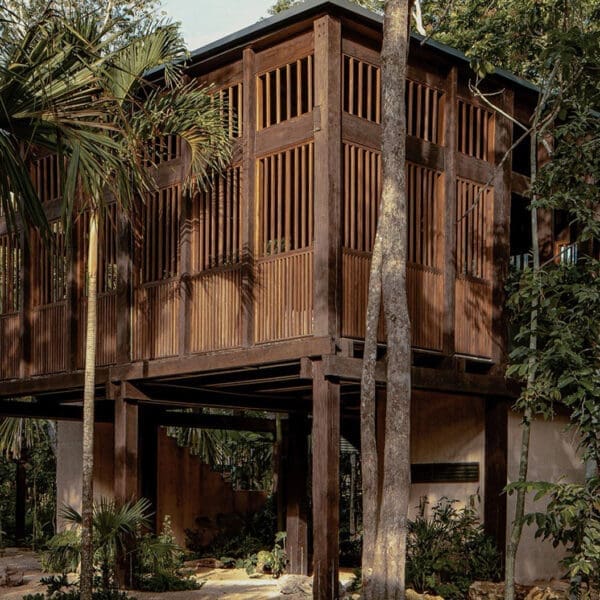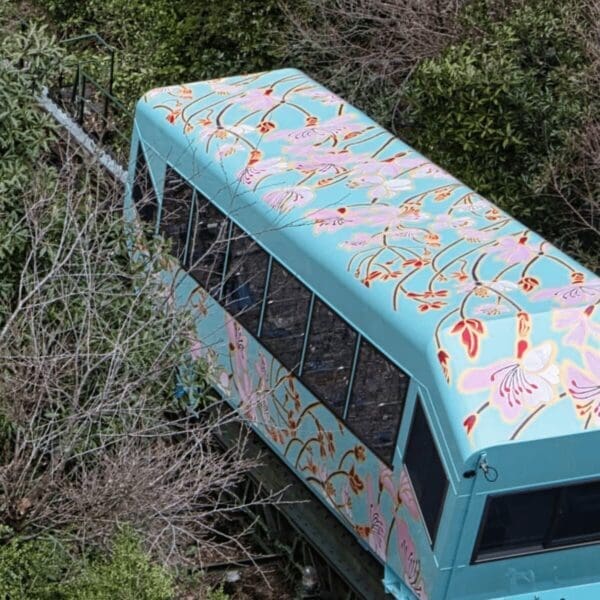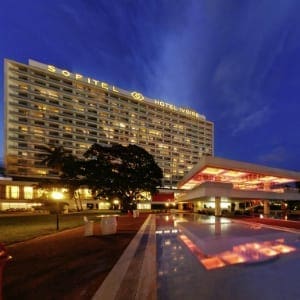As outlined in Design Hotels’ inaugural Further Forecast trend report, the industry is currently witnessing a radical shift away from extractive developments and toward the exploration of indigenous knowledge systems and practices. Other ways of knowing and existing provide hoteliers, conscious travelers, and cultural tastemakers alike with old ways to tackle new problems. With this in mind, we’ve rounded up six hotels that were both inspired by and root their philosophies in ancient traditions and ancestral wisdoms.
and toward the exploration of indigenous knowledge systems and practices. Other ways of knowing and existing provide hoteliers, conscious travelers, and cultural tastemakers alike with old ways to tackle new problems. With this in mind, we’ve rounded up six hotels that were both inspired by and root their philosophies in ancient traditions and ancestral wisdoms.
INDONESIABefore constructing Cap Karoso on the Indonesian island of Sumba, Originals Fabrice and Evguenia Ivara sought local advice and hosted a ceremony for 600 islanders to receive ancestral blessing to open a hotel. With the locals’—and ancestors’—approvel, the Ivaras conceived what is now a stunning beachfront property in the western Kodi region of an island with a carefully preserved heritage. Cap Karoso not only pays homage to Sumba’s people, cultures, and traditions, but consciously incorporates them into every aspect of its operations and philosophy—paired with a specific French flair rooted in the couple’s own Parisian lineage. Minimalistic structures are combined with five buildings constructed like a Sumbanese village at the center of the footprint, and the interior concept fuses contemporary aesthetics with handcrafts made by local artisans with age-old techniques. The reception and lobby area feature a cotton wall-hanging by Sumbanese master weaver Kornelis Ndapakamang as well as travertine blocks that reimagine Sumbanese megaliths. Guests can also experience the long-preserved cultures by interacting directly with local communities and joining them for traditional fishing outings, ikat weaving workshops, and classes to create natural dyes.
ITALYSet inside a masterfully transformed 12th-century monastery, Vocabolo Moscatelli places guests in the heart of Umbria and its longstanding traditions. Unfolding like its own village, the property centers around a piazza with a historical church—now a pared-down event space—and a 30-meter pergola, custom forged by the century-old Italian blacksmith brand Lispi & Co. The pergola also stretches back to a Mediterranean garden created by Fabiano Crociani, where guests can explore vegetable plants and an orchard of indigenous Umbrian fruit trees nurtured by agronomist Isabella Dalla Ragione and her non-profit organization the Arboreal Archaeology Foundation. Inside, restored original beamed ceilings, heavy stone fireplaces, and soft wooden floors are crowned with a bell that the Olivetan monks of Gubbio would ring when it was time for prayer.
FINLANDAn hour outside Helsinki, in the medieval coastal town of Porvoo, Runo Hotel Porvoo lyrically threads together Finnish traditions, history, and mythology. The word from which the hotel takes its name, runo, translates to “poem” and many original elements of the landmarked 1912 building have been preserved, including reliefs on the façade that depict mythical figures from the “Kalevala,” Finland’s national epic poem. Throughout the hotel, guests encounter repurposed traditional Karelian textiles and locally handcrafted pieces of furniture, some of which were made from 300-year-old pine floorboards sourced from Original Erkka Hirvonen’s family estate in the nearby countryside. The restaurant Runo Kitchen also showcases local food traditions, serving Finnish and Karelian dishes prepared with modern twists.
UNITED KINGDOMPerched at the junction between Edinburgh’s Old Town and New Town, Market Street Hotel offers guests a doorway to the city’s heart and history. Tucked behind a façade of Scottish stone, the hotel’s entrance features an expansive wall that pays homage to the dried earth of the lake Nor Loch that used to sit at the foot of the Edinburgh Castle. “When guests arrive, they are immediately connected to the heritage of the city,” says Christa van Camp, one of the hotel’s Originals. “In the hotel we exhibit what we call ‘the Scottish icons.’ In guestrooms, we play the music from a Gaelic female singer.” Channeling a brutal beauty inspired by the location’s character and history, the interiors include intentionally cracked walls juxtaposed with contemporary furniture and bursts of traditional fabrics, such as tartan, used in unexpected ways.
MEXICOAt Grupo Habita’s coastal property Hotel Terrestre in Puerto Escondido, Oaxaca, a solar-powered spa offers a temazcal-style sauna, which uses heated volcanic stones, water, and aromatic medicinal herbs to purify the body and soul. Here, travelers can partake in a purifying and healing ceremony based on a spiritual Mayan ritual and led by a Temazcaltzin, or shaman. Beyond using the four basic elements of earth, air, fire, and water, the ceremony is blessed with native sounds and language, and it concludes with a refreshing sensorial shower and a balancing tea in a peaceful area. The spa also features a hammam, providing different ways to experience water, including hot, tepid, cold, and steaming—a relaxing use of the elements inspired by ancient Turkish bathing traditions.
In the historic center of Puebla, a colonial city and UNESCO World Heritage Site on the road between Mexico City and Veracruz, La Purificadora reincarnates a late 19th-century water purification factory. Also imagined by Grupo Habita, the hotel incorporates elements that were found onsite by an archaeologist, such as bottles and glass fragments, into its construction and graphic design. The result is a striking yet functional mix of the past and present, of the raw and the refined. Rich woods, cracking and exposed-stone walls, and patterned tiles lend character to the interiors, while the hotel’s restaurant combines contemporary cuisine with traditional flavors of the region, highlighting the gastronomic richness of Puebla. As Carlos Couturier, a cofounder of Grupo Habita and one of the hotel’s Originals, says, “We always read the surroundings and their traditions to integrate local culture into our projects.”
















